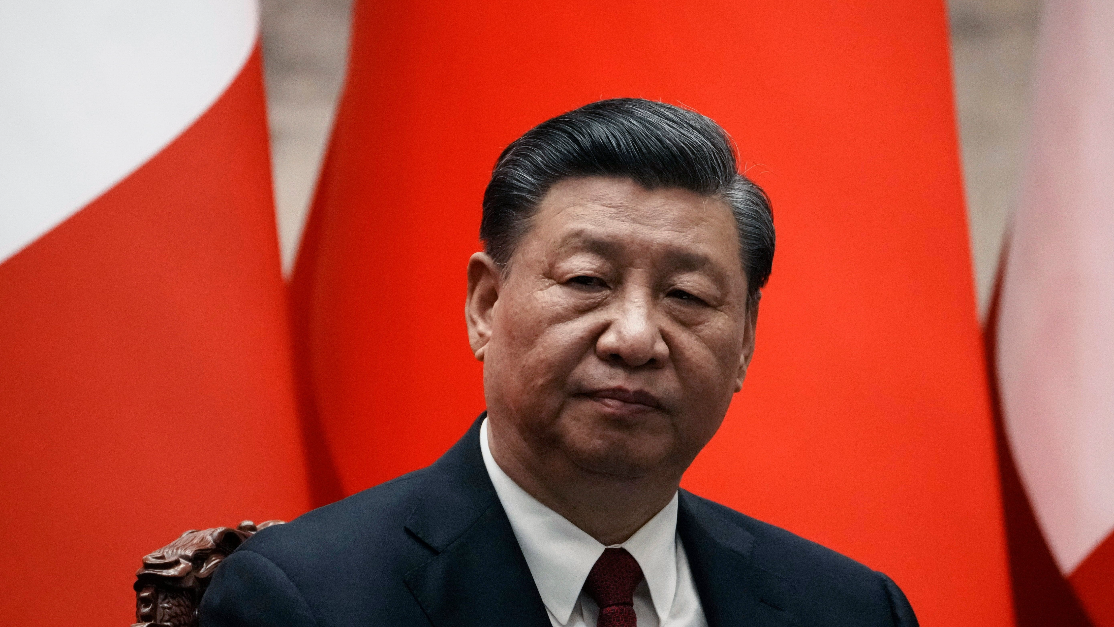Diplomacy
The Dawn of Xivilization: Israel and China’s New Global Initiatives

Image Source : Naga11 / Shutterstock
Subscribe to our weekly newsletters for free
If you want to subscribe to World & New World Newsletter, please enter
your e-mail
Diplomacy

Image Source : Naga11 / Shutterstock
First Published in: May.31,2023
Jun.12, 2023
In the last two years, China's leader, Xi Jinping, has announced three global initiatives: the Global Development Initiative (GDI), the Global Security Initiative (GSI), and the Global Civilization Initiative (GCI). What exactly are they, how do they differ from the Belt and Road Initiative (BRI), and what do they imply for the State of Israel?
In the last two years, Chinese leader Xi Jinping has announced three global initiatives: the Global Development Initiative (GDI), the Global Security Initiative (GSI), and the Global Civilization Initiative (GCI). These new initiatives are a means of bolstering the legitimacy of the Chinese Communist Party, with Xi at its head. More importantly, they reflect how China’s foreign policy has evolved and the lessons learned from its global engagement in the ten years since the Belt and Road Initiative (BRI) was launched. Due to the prominence of these initiatives in China’s foreign policy, Israel will need to closely monitor their progress and weigh the implications for its security and interests. While Jerusalem must strive to continue cooperating with China where those considerations are maintained, it must avoid blanket support for initiatives that serve China’s propaganda and interests at the expense of the West and the US in particular. Such backing could lend credence to Beijing’s efforts to undermine Washington’s security framework in the Middle East, which is the bedrock of Israel’s security. Additionally, it could support Beijing’s efforts to undermine universal norms and values.
“This is a victory for peace,” pronounced China’s top diplomat, Wang Yi, after overseeing the signing of a normalization agreement between Iran and Saudi Arabia on March 10, 2023. Wang emphasized that the credit for the breakthrough should be given to General Secretary Xi Jinping’s Global Security Initiative (GSI). The same initiative had been mentioned by Chinese Foreign Minister Qin Gang as a possible basis for resolving the Ukrainian war, and once more in a conversation with Israeli Foreign Minister Eli Cohen on April 17 as means of resolving the Israeli-Palestinian conflict.
Over the last decade, the Belt and Road Initiative (BRI) had been the centerpiece of Xi’s foreign policy, but three additional Chinese initiatives that have been launched in the last two years now challenge its primacy.
The first is Xi’s Global Development Initiative (GDI), which he announced at the UN General Assembly in September 2021. With global growth slowing in the shadow of COVID-19, its stated goal is to assist the international community in achieving the UN 2030 Agenda’s 17 Sustainable Development Goals (SDGs). In June 2022, China announced 32 concrete steps (“deliverables”) for its implementation, which bring together existing Chinese-led development initiatives while adding new tools and resources. Among them are a billion dollars added to the three-billion-dollar Beijing-led South-South development fund and the training of 100,000 workers by China.
The second is the Global Security Initiative (GSI), launched in April 2022. It complements the GDI based on the Sinicized Marxist notion that “security is a prerequisite for development, and development is a guarantee for security.” In a GSI Concept Paper published last February, on the one-year anniversary of the war in Ukraine, China called for a “joint, comprehensive, cooperative and sustainable” security that respects the sovereignty of countries and addresses their “legitimate security concerns.” Chinese leaders maintain that the GSI promotes a “new” security concept that complies with the UN Charter, abides by peaceful resolution of disputes, and maintains world peace in “traditional security” (areas related to warfare and power politics) and “non-traditional security” (such as climate, economy, cyber, and pandemics).
The GDI and GSI were joined in March by the Global Civilization Initiative (GCI), which focuses on “soft power” fields such as education, culture, and values. According to the Chinese foreign minister, the GCI’s goal is to promote “unity, harmony, mutual respect, and mutual understanding among different civilizations” and to support the “shared values of humanity.”
The BRI will be ten years old this December, and by that time, approximately 14,000 projects in 165 countries totaling trillions of dollars will have been associated with its name. Regardless of the economic contributions it makes to its partners, the initiative has had an “image problem” in recent years due to corruption, lack of transparency, and damage to the environment and to workers’ rights (the prevalent claim that China sets “debt traps” to seize assets, however, has been thoroughly debunked). Domestic and foreign funding constraints, as well as the number of projects and “competing brands” of the G7, the European Union, India, and Japan have exacerbated the challenges.
The BRI has its roots in the turn of the century, more than a decade before Xi came to power, in localized development initiatives in China’s border regions. In comparison, the new initiatives are his and, by definition, “global” from the start. Unlike the BRI’s Sinocentric “Silk Roads,” they promote issues that enjoy a broad international consensus, as a senior Chinese diplomat put it: “Who would oppose cooperation on development?” Indeed, as of April, the GDI had received the support of over a hundred countries and international organizations, as well as the UN Secretary-General’s blessing, and nearly 70 countries had joined the “Group of Friends of the GDI” headquartered in New York.
With the 69-year-old Xi entering his third term and no successor in sight, the initiatives are accompanied by a personality cult campaign (party-state propaganda aptly coined the term “Xivilization”). Their goal is to legitimize the leader’s perpetual rule and the party he heads, painting him as a “great Marxist strategist” who “cares for the fate of humanity” and is capable of identifying global “deficits” in development, security, trust, and governance. They also demonstrate the evolution of China’s foreign policy under Xi, from maintaining a low profile to “striving for achievement.” This activism, or “spirit of struggle,” is promoted in light of his catchphrase “great changes unseen in a century.” Because China has become so entwined with the world and vice versa, responding to the changes is not enough; Beijing must “get closer to world’s center stage” and seize the initiative so that the changes are in line with its interests and values.
Finally, the three initiatives demonstrate Beijing’s genuine faith in the “righteousness of its way.” After four decades of almost double-digit growth, China has turned from a backward country into an economic powerhouse. In Xi’s view, China’s rise is a mirror image of the decline of the United States and the West, and it attests to the superiority of the “Chinese model.” Along with the BRI, the three initiatives serve as the “blueprint” for a new world order – a post-Western world order – that will see the “great rejuvenation of the Chinese nation” and the realization of Xi’s vision of a “community with a shared destiny for mankind”:
As with the BRI, China has not yet established any clear-cut mechanisms, budgets, nor timetables for the three initiatives. As for the Chinese mediation between Iran and Saudi Arabia, it was evidently linked to the GSI only after the fact, much in the same way the BRI umbrella brought together a haphazard assortment of projects that had begun prior to its launch. The three initiatives, however, should not be dismissed as mere rhetoric. Even if most of their projects remain on paper, their centrality in China’s foreign policy necessitates Israel’s awareness of and monitoring of their development.
Xi Jinping invited Israel to “take an active part in the GDI” in a conversation with President Isaac Herzog in November 2021. Jerusalem has yet to respond or take an official stance on the three initiatives. But if it does – or if senior Israeli officials publicly support it – they will join the company of anti-liberal nations who have embraced it, giving China a propaganda win. If Israel joins and is later forced to withdraw, its relations with Beijing will suffer. In comparison, as the only G7 country to join the BRI in 2019, Italy is now looking for a way out, souring bilateral relations with China in the process. At the same time, outright opposition to the initiatives will be perceived as too confrontational. Therefore, Israel’s interest is not to join the GDI or express blanket support for it, but rather to continue project-by-project cooperation with China on development while balancing economic, foreign policy, and security considerations.
The GSI, in contrast, is intended to undermine US-led security frameworks. In the Middle East, it may jeopardize the progress of the Abraham Accords and the I2U2 (a minilateral grouping launched in 2022 and comprised of Israel, the US, India, and the United Arab Emirates). Furthermore, given that Beijing is dogmatically biased in favor of the Palestinians and provides Iran with an economic lifeline, international legitimacy, and technological solutions to ensure the regime’s survival, support for the GSI goes against Israel’s strategic interests.
Aside from security concerns, Israeli support will be misguided on a normative level. The GSI’s stated support for the UN Charter is a smokescreen for China’s refusal to condemn Russia’s invasion of Ukraine, the most egregious violation of the charter, which Beijing and Moscow justify as a response to “NATO expansionism.” Similarly, the good intentions that pave China’s road to “inter-civilizational dialogue and cooperation” under the GCI erode universal values that underpin human rights, dignity, and freedom from oppression, and reject the foundation of liberal democracies on which countries such as Israel were founded.
Just as it is not advisable to sign a contract without thoroughly reading it, Israel should not adopt China’s new initiatives without carefully examining their content and implications.
First published in :

Tuvia Gering is a researcher at the Diane and Guilford Glazer Foundation’s Israel-China Policy Center at the Institute for National Security Studies (INSS) in Israel , and a non-resident fellow in the Atlantic Council’s Global China Hub, and a Tikvah Fund’s Krauthammer fellow based in Jerusalem. Follow him on Twitter @geringtuvia.
Unlock articles by signing up or logging in.
Become a member for unrestricted reading!